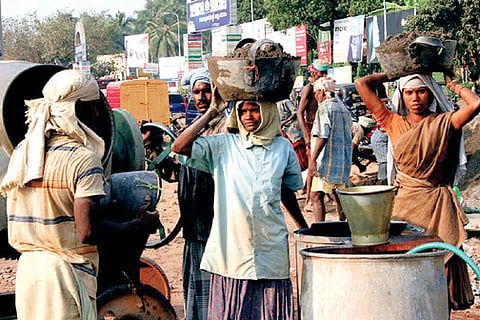

CHENNAI: They are the lost and invisible people in Chennai. In the myopic eyes of the State, they do not exist because their names do not figure anywhere in government records. Nevertheless, they constitute a major workforce at all construction sites in and around the metropolis. Coming from different parts of the country, the teeming migrant workers and their families — illiterate, unskilled, unprotected and exploited — comprise the city’s ugly underbelly, well-guarded from public view. Until a tragedy of the magnitude that claimed the lives of several construction workers from Andhra Pradesh at Moulivakkam last Saturday, exposes their plight.
Hailing from Bihar, Rajasthan, Odisha, West Bengal and the north-east, these migrant workers must be registered with the Tamil Nadu Construction Workers Welfare Board, but that seldom happens, according to Andrew Sesuraj M, project director of Jeeva Jyothi, an NGO which works for the children of migrant labourers. It’s little wonder that they are virtually non-existent in the eyes of law. Many migrant workers also end up as bonded labourers in brick kilns, tree cutting units, sugarcane units, agricultural units, woodcutting and charcoal unit and embroidery units. The Chennai office of International Justice Mission rescued a total of 657 labourers in 2013. Till June this year, the leading NGO has rescued 358 of them.
At the root of the problem is the involvement of several sub-contractors in hiring the workers. “Hence, in many cases, even their names will not be known,” Sesuraj points out. “Where they are brought from depends on the company. If it is an Andhra-based company’s project, a majority of the labourers may be from the State.”
According to the Rural Development Trust (RDT), these workers do not find support in any forum, be it hospitals, schools or police stations. Even a burial ground is beyond their reach. In the event of a labourer’s death, the local population does not allow them to be buried or cremated at local burial grounds, an activist alleged. Living on construction sites or pavements, their physical safety becomes a question mark. Add to that the fact that they have no ration card or basic amenities like drinking water and toilets. “Their basic existence is a struggle and goes unnoticed,” she added.
What is more, the children of these migrant labourers also find themselves at the receiving end of exploitation. According to the RDT, there are around 8,000 such children across Greater Chennai. Since their birth/death is not registered, they too are basically non-existent as per State records.